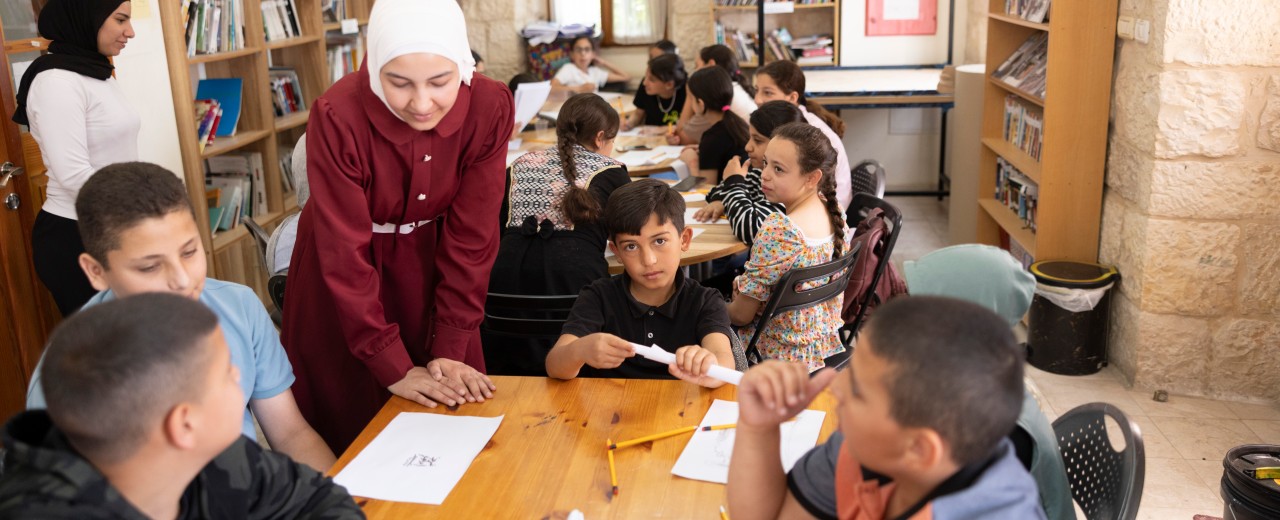
As of: 03/2024
In the context of the conflict in the Middle East, poverty and unemployment are widespread in the Palestinian territories. The impact is more pronounced for women than for men. In addition, traditional role models restrict their opportunities and it is not uncommon for them to experience psychological and physical violence. On behalf of the German Federal Government, KfW is financing a programme that is primarily geared towards women and promotes social infrastructure and greater resilience. The programme funds support social institu-tions such as kindergartens, women’s shelters and women’s counselling centres and, since Phase IV, micro and small enterprises run by women. The project also finances initiatives for more gender equality in the communities. The first three phases of the programme have already been implemented and the fourth started at the end of 2023.
Palestinian society is currently experiencing multiple crises. The Middle East conflict and domestic political division as well as the Palestinian Authority's chronic financial crisis are mutually reinforcing. The Palestinian territories are fragmented – they include East Jerusalem and the Gaza Strip as well as the West Bank. Based on the Oslo Accords, the West Bank is divided into Areas A, B and C, with Area C being under Israeli security and civil administration.
Poverty is widespread in Palestinian society. Unemployment is high, with women less likely to pursue paid employment than men. In 2022, only 18.6% of Palestinian women were employed, compared to 70.7% of men. When women run a business, it is usually small and informal. Few women are able to secure financing to expand their business. However, the disadvantages suffered by women in the Palestinian territories are not only economic, they are social too. Violence against women and girls is a serious problem. Many women are affected by domestic abuse – both physical and psychological.

With the Investment Programme for Resilience (IPR), KfW is acting on behalf of the German Federal Ministry for Economic Cooperation and Development (BMZ) in the financing of a programme in Jerusalem, Gaza and Area C in the West Bank to strengthen the resilience of Palestinian society against crises. The programme’s focus is to support women and promote gender equality, which aligns fully with the principles of feminist development cooperation.
This programme has already been running for several years and in various phases. A total of EUR 57 million has been made available for this purpose since 2020 and further commitments are being assessed. The project is currently focused on three components:
The initial component supports up to 71 non-governmental institutions (18 of which are currently in Phase IV) – these include women’s clinics, women’s refuges, legal advice and institutions offering psychosocial assistance. Existing buildings are often renovated and expanded. The personnel responsible for management of the institutions are trained to operate and maintain the facilities. The provision of social services, especially for women and girls, has improved as a result.
The second component includes the promotion of around 170 women-owned micro and small enterprises as well as cooperatives that promote women. In order to enhance product quality and market access, partnerships such as those with Monshati, the national platform for small and medium-sized enterprises, and the Palestinian Business Prosperity Centre (PALPRO) are being established.
The third component relates to activities and initiatives that help to increase the participation of women in decision-making processes within communities and reduce gender-based power structures in the long term. The communities develop the activities themselves and implement them collectively. Men, such as the fathers, brothers, partners and community members, are also engaged. Awareness-raising programmes aim to reduce violence against women.
Approximately 250,000 people (54,000 of these are in Phase IV) will benefit from the improved social services. To date, 18 projects have already been completed across three phases of the programme. For example, the premises for social institutions such as a women’s centre in Shuafat (East Jerusalem), a kindergarten also in East Jerusalem and the Saint Joseph school in the Old City of Jerusalem have been expanded or renovated. Such infrastructure programmes have created short-term employment amounting to around 155,000 person-days. In some cases, the construction programmes are the basis for the continued operation of the facilities, as they could potentially be closed in the event of structural defects.
The IPR also has relevant employment outcomes. The construction programmes at the social institutions will result in the creation of up to 5,900 temporary jobs. Concurrently, up to 500 new permanent jobs will also be created, as the enlargement will enable social institutions to expand their services in the long term, thereby increasing their staffing requirements. In the context of emergency aid measures implemented in response to Covid-19, more than 1,500 temporary jobs were created in the healthcare sector. Last but not least, up to 1,300 women will benefit from improved economic participation, for example through the promotion of women’s cooperatives, which will also augment family incomes and reinforce the role of women in the communities.
The project contributes to the achievement of these following United Nations Sustainable Development Goals:
KfW Group
KfW Development Bank
NfR, participations and MENA
Crisis prevention and management
Share page
To share the content of this page with your network, click on one of the icons below.
Note on data protection: When you share content, your personal data is transferred to the selected network.
Data protection
Alternatively, you can also copy the short link: https://www.kfw-entwicklungsbank.de/s/enzB08n_
Copy link Link copied